It can be alarming if your Great Dane is coughing! Any time our beloved pets are hacking, choking, gagging, or coughing it’s definitely alarming.
We recently had a major health scare with our otherwise very healthy 8-month Mantle Dane Figaro.
It started with a dry cough and within hours become a life-threatening emergency.
Coughing is something to take seriously. We don’t want to scare you, but if you are hearing the tell-tale signs of your dog being unwell, you’ve come to the right place for information.
If your Great Dane is coughing and has a persistent dry or wet cough, we encourage you to see your veterinarian as soon as possible.
As you will see below, nearly every reason that your Great Dane is coughing could be moderately serious, if not severe, and needs to be addressed.
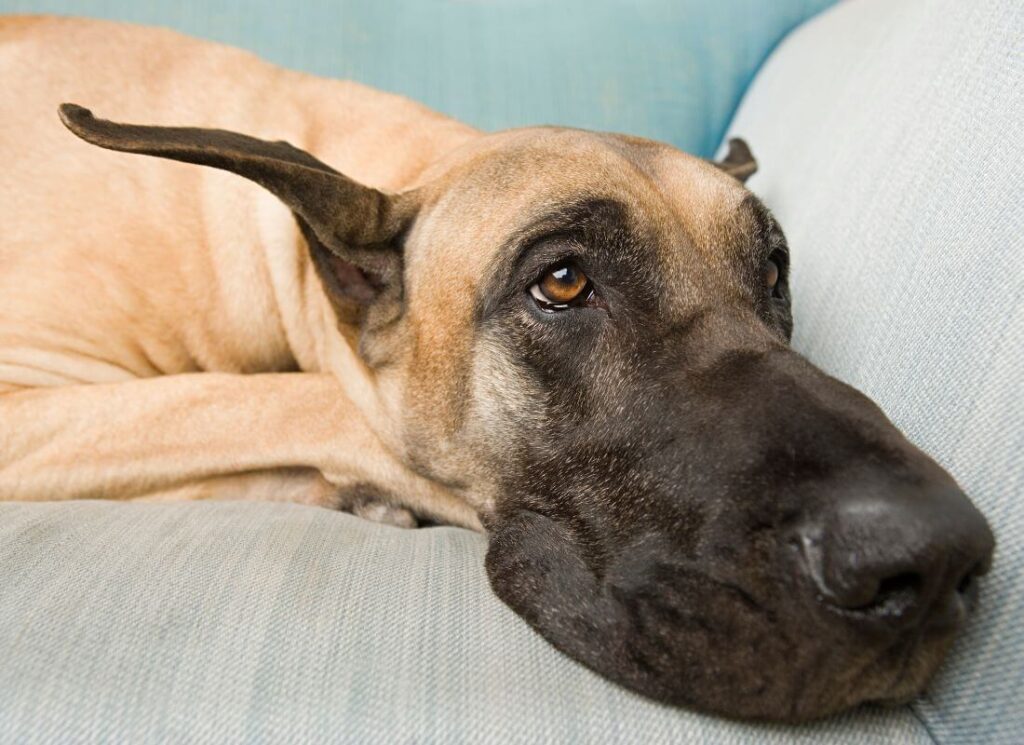
Reasons why your Great Dane is coughing
While the occasional cough is not uncommon for any dog, there are specific reasons why a Great Dane might start coughing more frequently. Understanding the underlying causes is crucial for ensuring your pet’s well being. The problem with coughing in dogs is that it’s rarely a benign problem; coughing is nearly always an indication of something more serious.
Here are the most common reasons why a Great Dane may be coughing:
- Heartworms & other parasites
- Congestive Heart Failure, including DCM/Dilated Cardiomyopathy (Genetic or Nutrition-Related)
- Foreign object or fluid in the lungs (aspiration) or throat (irritation)
- Distemper
- Bronchitis
- Pneumonia
- Lung Cancer
- Fungal Infections
- Kennel Cough (which while generally mild can easily become deadly if left untreated)
I cannot say this enough; if your Great Dane is coughing, your first course of action should be to call (and visit) the veterinarian. Even if you think you are dealing with a basic common case of kennel cough.
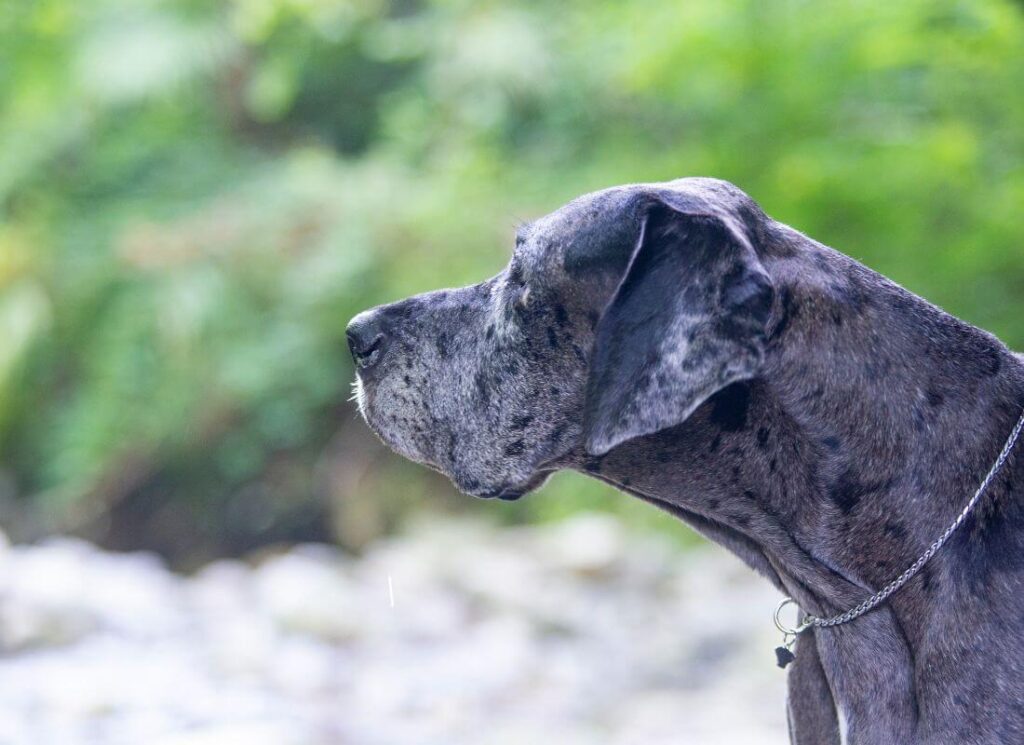
Heart Worms in Great Danes Coughing
Heart worms are NASTY and may be the reason that your dog is coughing.
Heart Worms can happen to dogs anywhere, however they are most common in warm, humid areas.
These nasty Heart worms are transmitted via mosquitoes. This process of reproduction can result in 100’s of long wiggly worms filling up your dog’s heart. This can cause your dog to cough, and will eventually lead to death if left untreated.
Heart worm treatment often takes a long time and can be expensive, dangerous, and difficult especially if you haven’t caught it early.
Your veterinarian can prescribe preventatives, and yearly heart worm tests should be done during routine veterinary visits. We recommend that all Great Danes receive veterinary backed flea, heartworm, and tick prevention. Learn more about this HERE.
Interested in learning more about heartworms in general? Read more about heart worms HERE.
Dilated Cardiomyopathy (DCM) & Congestive Heart Failure Causes Coughing
Great Danes with Congestive Heart Failure or DCM (Dilated Cardiomyopathy) will tire out easily and may develop a persistent cough.
DCM (Dilated Cardiomyopathy) is one cause of congestive heart failure, however, there are many others (including birth defects, disorders of the heart and MVI (Mitral Valve Insufficiency).
Many times, a dog with DCM dog will show no symptoms at all. The cough that develops is often an indication that the disease progression has reached a serious and dire level.
There are two forms of DCM. Genetic (primary) and Nutrition-Related (secondary).
Ethical Great Dane breeders do an echocardiogram on their dogs prior to breeding. This OFA health test can help to rule out the existence of heart disorders that may have genetic links, hoping to eliminate genetic (primary) DCM from their pedigree.
Secondary DCM (Nutrition) is caused by feeding an unbalanced, incorrect diet. Unfortunately, MANY dry diets on the market are unsafe to feed.
If your dog has been fed a boutique food diet, whether it is ‘grain-free’ or not and is coughing, you must see a veterinarian immediately.
Boutique food brands include Fromm, Victor, 4Health, Diamond Naturals, Costco, Nulo, Nutro, Nutra Nuggets, Taste of the Wild, The Farmer’s Dog, Spot & Tango, Instinct, Nature’s Logic, Open Farm, or any other brand that doesn’t have a board-certified veterinary nutritionist or PhD in Animal Nutrition on staff to formulate and thoroughly test their foods.
We only recommend feeding diets that meet WSAVA recommendations. These diets include Purina, Hill’s, Royal Canin, Eukanuba, and Iam’s. Purina and Hill’s are often prescribed to reverse nutritional DCM; we know they are a quality, safe, and nutritious food backed by a lot of science and research.
If your dog is tiring easily and has difficulty breathing and/or a persistent cough, see a veterinarian immediately. For more information about dietary DCM and choosing pet food, the following links should be very helpful to you!
Is Grain-Free Dog Food Healthier?
Dog Food DCM Update
Dr. Judy Morgan & DCM Misinformation
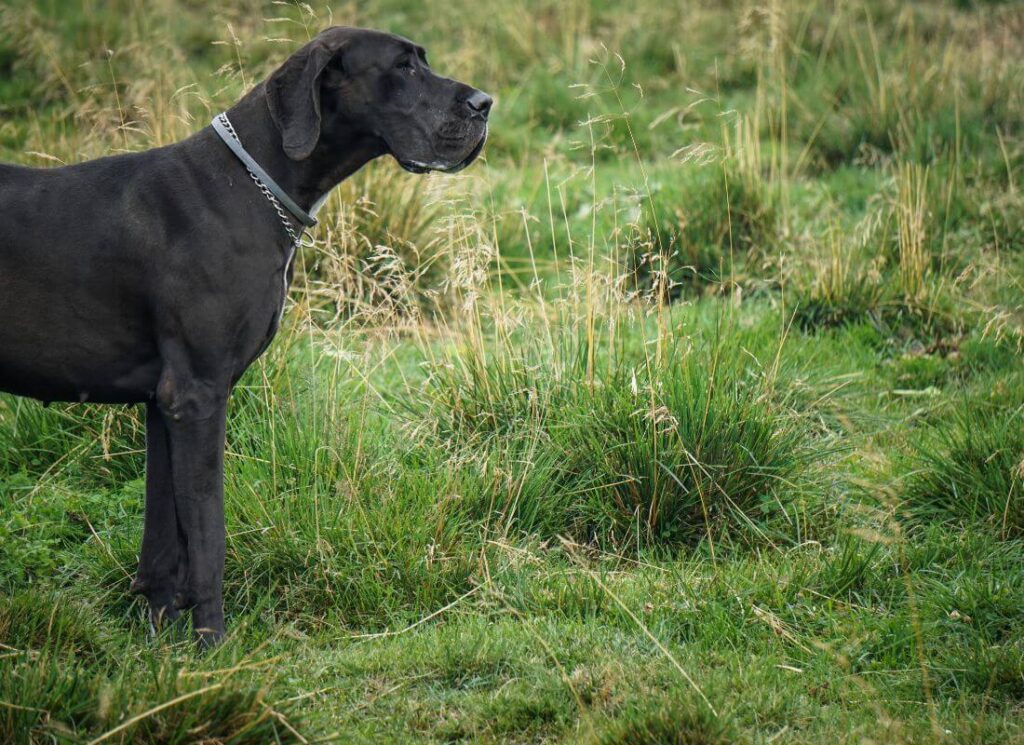
Kennel Cough in Great Danes
Kennel cough is a COMMON cause of cough in dogs, and the least alarming overall. It does, however still require monitoring and treatment, as Kennel Cough can quickly turn into deadly pneumonia.
Kennel Cough is highly contagious and often picked up in places such as dog parks, pet stores, and training or boarding facilities. There is a kennel cough vaccine (also called ‘Bordatella’), however, it is not effective against every strain.
Your dog may get kennel cough whether they have been vaccinated or not!
Symptoms of kennel cough in Great Danes include:
- Unproductive dry cough that may be persistent
- Runny nose
- Sneezing
- Low energy
- Mild fever
- Decreased appetite
While kennel cough itself is usually simple to treat, you should still see your veterinarian.
Untreated kennel cough can quickly become serious, and antibiotics may be needed, even if your dog was vaccinated against kennel cough!

Pneumonia in Great Danes & Coughing
Pneumonia is serious and requires immediate medical attention.
A dog can get pneumonia anytime a cough has developed, especially if the cough is the result of a foreign body or substance in the lungs (such as water or mud, for example).
Kennel cough can progress to pneumonia if left untreated.
If your dog’s cough appears to be getting worse or sounds wet, head to the emergency veterinarian.
Left untreated, bacterial infections and fluid can build up and cause high fever and organ failure.
Here are some signs that your dog has a serious problem and may be experiencing pneumonia:
- Throwing up, bile, foam
- Weakness, lethargy
- Pale gums, sunken eyes
- Wet cough
- Difficulty breathing/stridor
- Shaking, drooling or panting
- Fever
Great Dane Not Eating: What to do
What Foods Help a Dog’s Upset Stomach?
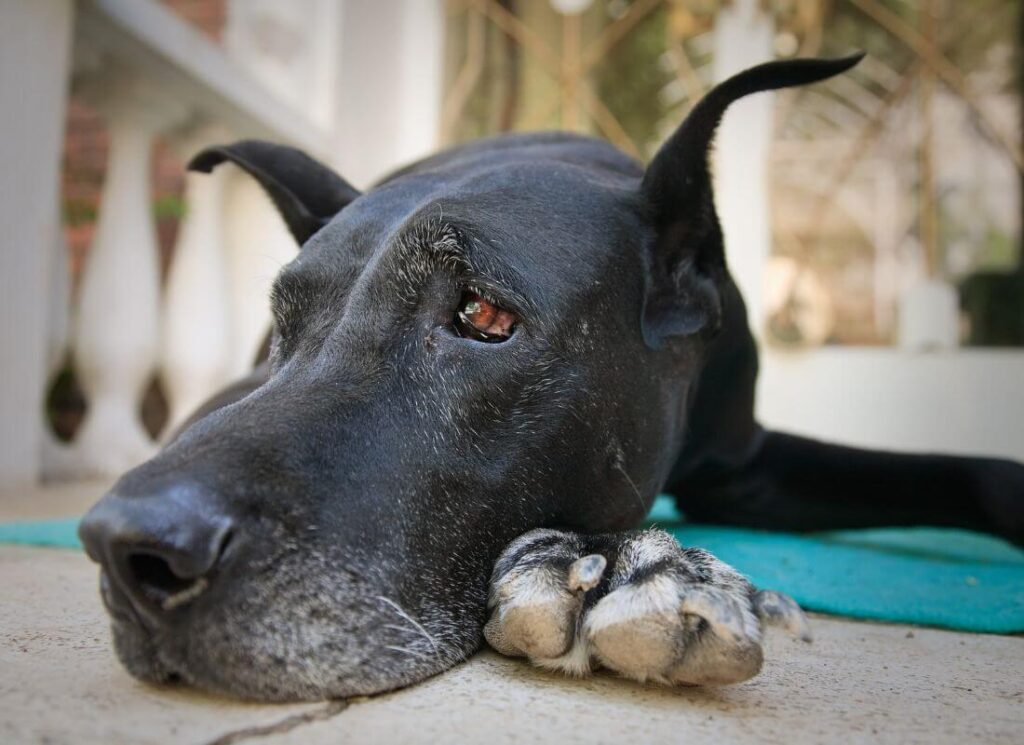
Distemper in Great Danes
Distemper is a serious viral illness that affects dogs of all ages.
The virus can cause a number of symptoms, including fever, coughing, and diarrhea. In severe cases, it can even lead to seizures and death.
The good news is that distemper is preventable with vaccination.
Puppies should be vaccinated at an early age, and adult dogs should receive booster shots every year.
If you suspect that your dog has distemper, it is important to seek veterinary care immediately. With prompt treatment, many dogs are able to recover from the illness.
Lung Cancer in Dogs
While lung cancer is relatively rare in dogs, it is still a serious condition that can have a devastating impact on your furry friend.
Symptoms of lung cancer in dogs include:
- Difficulty breathing
- A persistent cough
- Loss of appetite
If you notice any of these symptoms, it’s important to take your dog to the vet for a check-up as soon as possible. Early diagnosis and treatment is critical for giving your dog the best chance possible of beating the disease.
Treatment options for lung cancer in dogs include surgery, radiation therapy, and chemo therapy.
The type of treatment that is best for your dog will depend on the severity of the cancer or tumor and how far it has spread.
Fungal Infection & Coughing in Dogs
Systematic Fungal infection is a surprising cause of cough in dogs.
They can be difficult to treat, so early diagnosis is essential.
Dogs can get a fungal infection from soil, water, or other animals.
Symptoms include:
- Coughing
- Nasal discharge
- Blood
- Watery eyes
- Lethargy
- Eye problems
- Seizures
- Muscle Wasting
If left untreated, the infection can cause serious damage to the lungs and other organs and may lead to paralysis or death.
How to Treat a Dog’s Cough
Coughing in dogs is nearly always serious. We recommend that you seek veterinary care if your dog is coughing.
The veterinarian will listen to your dogs lungs and heart and take a temperature.
Some of these symptoms are also present in bloat or because a dog ingested something poisonous, and they will be able to sort out the problem. Make sure to tell your veterinarian about the timeline of symptoms and what the early symptoms looked like.
Additional diagnostics may include x-rays, echocardiogram, blood work and monitoring (hospitalization).
Depending on the reason for the coughing, treatment may include antibiotics (IV or oral), fluids (IV or oral), oxygen support, steam therapy, surgery, sedation, ongoing medications, a change in diet, and rest.
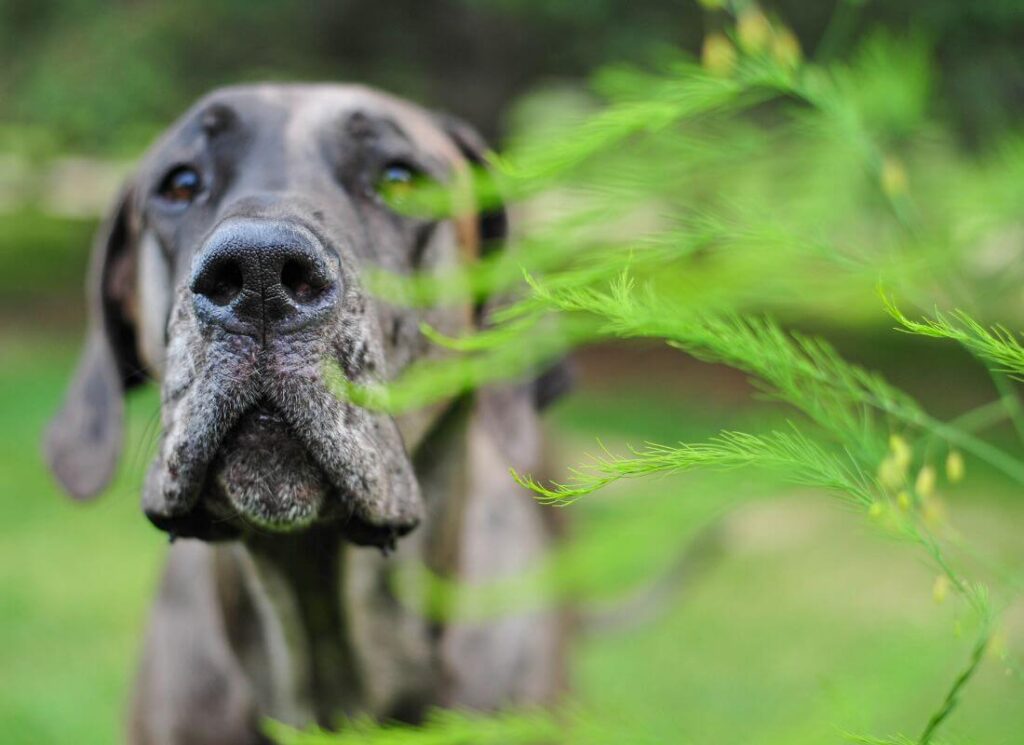
Holistic Cough Treatments for Dogs
Once you have worked with your veterinarian to develop a comprehensive, scientific treatment plan you may wish to use some holistic home support.
Here are some holistic cough therapies for dogs.
As before, always check with your veterinarian!
Fluids – Make sure your pup is drinking enough water and staying hydrated. You can encourage drinking by adding bone broth to water or by soaking kibble. If at anytime you see signs of dehydration (sunken eyes, lethargy, dry nose, vomiting, lack of skin elasticity or sticky gums), consult your veterinarian.
Rest – Just like humans, dogs need rest to recover! Now is not the time to visit the dog park, training center or do anything stressful (visiting the groomer comes to mind!).
Walks – Your veterinarian may advise that you to take your dog out on short walks to keep the body moving and encourage fluid and gunk in the lungs to break up and move along. If your dog pulls, use a non-obstructive y-front harness and a long leash so that the trachea isn’t further irritated by tension from the collar or training tools.
Humidifier & Steam Therapy – It can be helpful to use a humidifier or sit in a humid bathroom. This can provide some comfort and encourage your dog to cough up any remaining gunk.
Temperature Monitoring – By keeping tabs on your dog’s body temperature, you can be more aware of early signs that an infection is building or not being adequately targeted by medications.

Leave a Reply